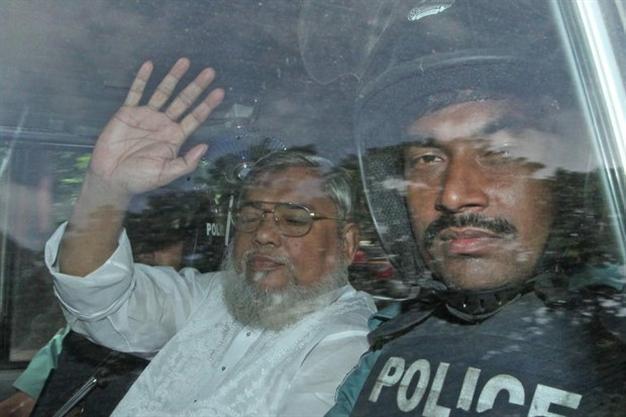Bangladesh opposition leaders to hang for war crimes
DHAKA - Reuters

AFP photo
Bangladesh's Supreme Court on Nov. 18 rejected final appeals from two opposition leaders against death sentences for atrocities committed during the 1971 war of independence, rulings that are likely to spark protests by their supporters.Muslim-majority Bangladesh has seen a rise in Islamist violence in recent months, with two foreigners and four secular writers and a publisher killed this year.
Ali Ahsan Mohammad Mujahid, 67, secretary general of the Jamaat-e-Islami party, was found guilty of five charges including torture and the murders of intellectuals and minority Hindus while he commanded Al Badr, an auxiliary force of the Pakistani army, during the war to break away from Pakistan.
Salahuddin Quader Chowdhury, 66, former legislator from former premier Khaleda Zia's Bangladesh Nationalist Party (BNP), was convicted in October 2013 on charges of genocide, religious persecution, abduction and torture during the war.
"The entire nation is happy with the verdicts," Attorney General Mahbubey Alam told reporters outside the packed court amid tight security.
The rulings mean the two could be hanged at any time unless they seek mercy from the president.
Mujahid, social welfare minister from 2001 to 2006 under Khaleda, would be the first former minister and the third to be hanged while Chowdhury would be the first BNP leader to go to the gallows unless they are granted clemency.
"It is up to them whether they want to seek mercy or not," defence counsel Khandaker Mahbub Hossain told reporters.
Just a few hours before the rulings, an Italian priest was wounded in the latest attack on foreigners in Bangladesh. Islamic State of Iraq and the Levant (ISIL) militants have claimed responsibility for earlier attacks on foreigners.
The government, however, rejected ISIL's claim and blamed the growing violence in Bangladesh on its domestic political opponents linked to Islamist parties.
Prime Minister Sheikh Hasina opened an inquiry into crimes committed during the war in 2010, paving the way for prosecutions by a war crimes tribunal that Islamists have denounced as part of a politically motivated campaign aimed at weakening Jamaat-e-Islami's leadership.
Two Jamaat leaders have been executed, one in December 2013 and another in April. They declined to seek clemency from the president.
U.S. lawmakers and international human rights groups say the tribunal's procedures fall short of international standards.
The Tom Lantos Human Rights Commission, set up by the U.S. Congress, has expressed "serious concerns" over the death penalties.
Defence counsel for Mujahid were intimidated and arrested, the commission said this week citing reports, while premier Hasina's reported call to "try the war criminals quickly" raised concerns over whether due process had been observed.
No Peace Without Justice, a non-profit organisation based in Italy, has called the tribunal's proceedings "a weapon of politically influenced revenge whose real aim is to target the political opposition".
The government denies the accusations.
East Pakistan broke away to become independent Bangladesh after the war between India and Pakistan.
About three million people were killed.
















